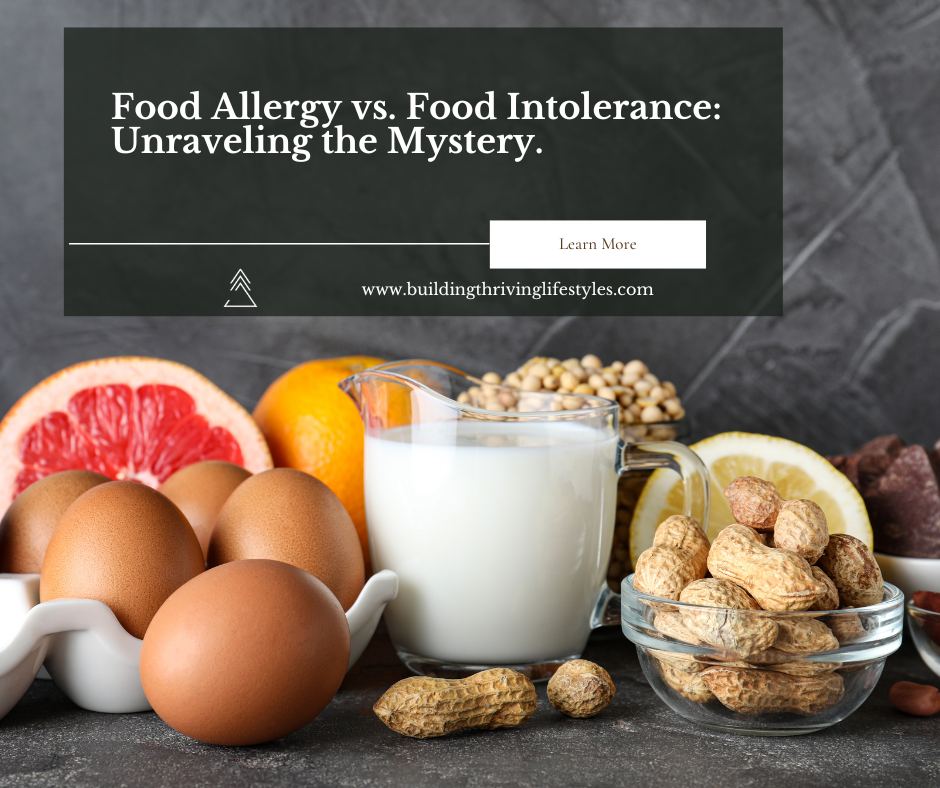#65 - Food Allergy vs. Food Intolerance: Unraveling the Mystery.
Introduction
In today's fast-paced world, more and more people are becoming mindful of their dietary choices. Whether it's for health, environmental, or ethical reasons, understanding your body's relationship with food is essential. While some individuals may be fortunate to indulge in a wide variety of foods without any issues, others must navigate the complex terrain of food allergies and intolerances. In this article, we will shed light on the crucial distinctions between these two conditions, explore the signs and symptoms of food intolerance, and discuss the power of food journaling and elimination diets in helping you find out if certain foods should be avoided.
Food Allergy vs. Food Intolerance: What's the Difference?
Food Allergy: A food allergy is an abnormal immune response to a specific protein found in a particular food. It occurs when the immune system mistakenly identifies a harmless food protein as a harmful invader. Common food allergens include peanuts, tree nuts, shellfish, eggs, milk, and soy. The symptoms of a food allergy can range from mild to severe and may include hives, swelling, difficulty breathing, and anaphylaxis. Food allergies are typically diagnosed through skin prick tests, blood tests, or oral food challenges conducted by allergists.
Food Intolerance: Food intolerance, on the other hand, is a non-immunological reaction to certain foods. It occurs when your body is unable to properly digest or process a particular component of a food, such as lactose or gluten. Food intolerances are usually less severe than allergies and may manifest with symptoms like bloating, gas, diarrhea, or stomach cramps. Unlike allergies, food intolerances are not life-threatening, but they can significantly impact your quality of life.
Signs and Symptoms of Food Intolerance
Food intolerances can be tricky to identify because their symptoms are often delayed and vary from person to person. Here are some common signs and symptoms of food intolerance:
Gastrointestinal Issues: These are the most prevalent symptoms and may include bloating, gas, diarrhea, constipation, and stomach cramps.
Skin Problems: Some people with food intolerances may experience skin issues like hives, eczema, or rashes.
Headaches: Persistent headaches can be triggered by certain foods, especially those containing additives like monosodium glutamate (MSG).
Fatigue: After consuming a problematic food, you might feel unusually tired or lethargic.
Mood Changes: Food intolerances can sometimes lead to mood swings, irritability, or even anxiety and depression.
Joint Pain: In some cases, joint pain and inflammation may be related to food intolerances.
Finding the Culprit: Food Journaling and Elimination Diet
If you suspect you have a food intolerance, there are two valuable tools at your disposal to help identify the problematic foods: food journaling and elimination diets.
1. Food Journaling: Keep a detailed record of everything you eat and drink, along with any symptoms you experience. Note the time of consumption, the quantity, and any symptoms that arise afterward. A food journal can reveal patterns that connect certain foods to specific symptoms over time.
2. Elimination Diet: Under the guidance of a healthcare professional or a registered dietitian, embark on an elimination diet. This involves removing common trigger foods from your diet for a set period, typically 2-4 weeks. After this period, slowly reintroduce each eliminated food one by one, monitoring your symptoms as you go. This systematic approach can help pinpoint which foods are causing your intolerance.
Conclusion
Understanding the key distinctions between food allergies and food intolerances is the first step towards building a thriving and healthy lifestyle. Food intolerances, though often less severe than allergies, can significantly affect your well-being. By being vigilant about your symptoms and employing tools like food journaling and elimination diets, you can uncover the culprits behind your food intolerances and make informed choices about your diet. Remember that seeking the guidance of a healthcare professional or registered dietitian is crucial in this process, as they can provide expert advice and support on your journey to a healthier and happier you.

